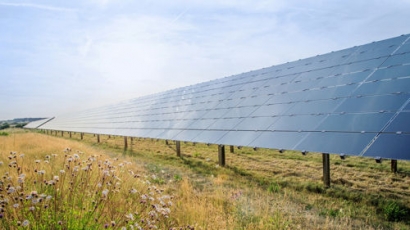
Despite the challenging situation due to the current coronavirus pandemic, Bosch is pressing ahead with its highly ambitious climate action plans: “Climate change isn’t taking a break, so neither are we. By the end of the year, we will achieve our ambitious goal of no longer leaving a carbon footprint,” said Volkmar Denner, the CEO of the Bosch Group.
All 400 Bosch locations worldwide will then be climate-neutral. The company’s German sites have been climate-neutral since the end of 2019. “Our efforts for the energy transition will continue after 2020. Investing in renewables is an important testament to this,” Denner added, explaining that while climate action costs money, doing nothing would be more expensive – especially since investing in energy efficiency also leads to cost savings.
Besides renewables, Bosch is investing above all in energy efficiency at its own locations in order to realize carbon neutrality. From now until 2030, the company intends to further improve the ecological quality of its carbon neutrality by gradually ramping up these two measures. As an effective short-term lever, Bosch is also purchasing green electricity from existing plants and fully offsetting unavoidable carbon emissions through selected climate-action measures.
“In 2020, the share of carbon offsets will be far lower than projected. In other words, we are making faster progress than we expected in further improving the quality of the measures we take,” Denner said.
Bosch intends to significantly increase the share of renewables in its energy consumption. The three new long-term agreements for PV electricity are moving the company toward achieving this goal; they are also driving the energy transition forward. In total, Bosch emitted around 1.94 million metric tons of CO₂ worldwide in 2019 (Scope 1+2) – already about one-third less than in the previous year.
The contracting parties RWE, Statkraft, and Vattenfall will each supply Bosch exclusively from newly constructed plants. Electricity from the three suppliers’ subsidy-free PV parks will be transported through the public grid to be consumed at Bosch locations in Germany. From 2021 onward, this will cover a total annual volume of more than 100,000 megawatt hours – equivalent to the annual electricity consumption of up to 30,000 private households or 70% of the electricity consumption at the Bosch site in Feuerbach. Under optimum PV conditions, the maximum output will be sufficient to cover the entire electricity requirements of the plants in Feuerbach, Homburg, and Bamberg simultaneously, at least for a few hours. The long-term contracts replace part of Bosch’s green electricity purchases and have a duration of between 12 and 16 years. Statkraft has already been supplying power since May.
The Bosch Group is also aiming to sign such long-term contracts outside Germany. In Mexico, for example, the company already covers up to 80 percent of its energy demand with such new clean power. Many of the Bosch locations there get electricity from a newly constructed wind farm belonging to the energy group Enel, which generates some 105,000 megawatt hours per year. The partnership with Enel is due to run for 15 years.
In addition to exclusive purchases from renewable energy sources, Bosch is expanding its in-house power supply: the company currently generates some 60,000 megawatt hours per year from almost 50 PV systems at its own sites. Bosch’s Nashik site in India is home to the largest plant of this kind in the Indian automotive industry. In total, Bosch plans to expand its on-site renewable energy supply to 400,000 megawatt hours by 2030. A PV system at Bosch’s Hemaraj plant in Thailand, scheduled for completion in 2020, will generate 1,300 megawatt hours of electricity per year.

